反义疑问句讲解
全面讲解——反义疑问句

反义疑问句反义疑问句(The Disjunctive Question) 即附加疑问句。
它表示提问人的看法,没有把握,需要对方证实。
反义疑问句由两部分组成:前一部分是一个陈述句,后一部分是一个简短的疑问句,两部分的人称时态应保持一致。
句型解释1.陈述部分肯定式+疑问部分否定式可记为前肯后否2.陈述部分否定式+疑问部分肯定式可记为前否后肯They work hard, don’t they?主语一般词语附加疑问句中主语用和主语一致的主语,用主格。
不定代词当陈述部分的主语是( 1 )用one时,后面的疑问句可用one/he.(2)everything,anything,nothing,something时,附加疑问句中主语用it 不用they(3)this,that,或those,these时,附加疑问句中主语用it和they.(4)everyone,everybody,someone,somebody等,附加疑问句中主语一般用he/they.(5)不定式,动名词,其他短语,附加疑问句中主语一般用it。
(6)在there be句型中,附加疑问句中主语一般用be/情态动词/助动词+there。
特殊句型否定意义的词否定意义的词(1)当陈述部分有never,seldom, hardly,few,little,barely, scarcely, nothing 等否定意义的词时,后面的反意疑问句则为肯定形式:There are few apples in the basket, are there?He can hardly swim, can he?They seldom come late, do they?(2)当陈述部分含有否定意思的词是unhappy,dislike,unfriendly等含有否定词缀的派生词,也就是有un-前缀、-less后缀等含有词缀而意思否定的词,当做肯定句处理,疑问部分要用否定形式。
反义疑问句详细讲解课件(PPT27张)
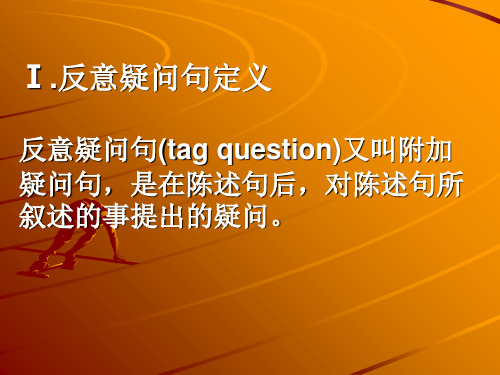
7.当陈述部分的主句是I think (expect, believe)等结构时,反 意疑问句的附加部分则往往与从 句中的主语和谓语动词保持对应 关系,但要注意否定的转移。 例如:
I think he’s funny, isn’t he? I don’t believe she likes my
You must have seen the film last week, didn’t you?
6. 当陈述部分是I am…时,反意疑 问句部分通常要用aren’t I;如陈述 句部分的主语是I am not时,反意疑 问句部分通常要用am I。 例如:
1)I am a teacher, aren’t I?
Ⅰ.反意疑问句定义
反意疑问句(tag question)又叫附加 疑问句,是在陈述句后,对陈述句所 叙述的事提出的疑问。
Ⅱ.基本结构:
陈述句+逗号+简短的一般疑问句?
遵循前肯定后否定前否后肯式的原则
①前肯后否式。例如:
You are all students, aren’t you﹖
②前否后肯式。例如:
Let’s have a rest, shall we? 以let us开头的祈使句,不包括 说话人在内,因此反意疑问句的 附加部分用will you。例如:
Let us stop now, will you?
Ⅳ. 反意疑问句的回答 “ 根据事实回答”
对反意疑问句的回答,无论问题的提法如何,如果 事实是肯定的,就用yes,事实是否定的,就要用no。 要特别注意陈述句部分是否定结构,反意疑问句部分 用肯定式提问时,回答yes或no与汉语正好相反。这 种省略回答的yes要译成“不”,no要译成“是”。
反义疑问句讲解

反义疑问句讲解反义疑问句专题反义疑问句由“陈述句+简略疑问句”两部分组成。
第一部分表达一种看法,第二部分用来质疑或表示证实。
动词时态和性质应保持一致,而且肯定和否定形式彼此相反。
例如,陈述部分为肯定式时,疑问部分用否定式,陈述部分为否定式时,疑问部分用肯定式。
例如,“He likes English。
doesn’t he?”和“He doesn’t like English。
does he?”需要注意的是,如果陈述部分含有no。
hardly。
never。
few。
nothing。
little。
nobody。
seldom等否定词或半否定词,其疑问部分要用肯定式。
例如,“He has few friends here。
has he?”和“She said nothing。
did she?”如果陈述部分含有带否定前缀或后缀的词,疑问部分仍用否定式。
例如,“It is unfair。
isn’t it?”和“It is impossible。
isn’t it?”还有一些词,如unnecessary、useless、hopeless、disagree、impolite、unfinished、unequal、misunderstand、antisocial、incorrect等也属于这一类。
当陈述部分为there be句型时,疑问部分仍用there作“主语”。
例如,“There was nothing in the room。
was there?”当陈述部分的主语是指示代词或复合不定代词(this。
that。
everything。
something。
nothing。
anything。
these。
those。
someone。
everyone。
everybody。
somebody。
no one。
nobody)时,疑问部分用it、they等代词。
例如,“That is a new car。
isn’t it?”和“Everything is ready。
(完整)反义疑问句讲解和练习(答案)
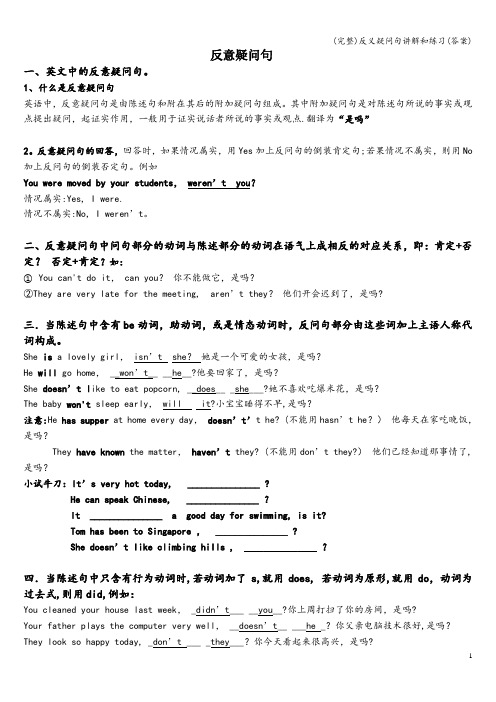
反意疑问句一、英文中的反意疑问句。
1、什么是反意疑问句英语中,反意疑问句是由陈述句和附在其后的附加疑问句组成。
其中附加疑问句是对陈述句所说的事实或观点提出疑问,起证实作用,一般用于证实说话者所说的事实或观点.翻译为“是吗”2。
反意疑问句的回答,回答时,如果情况属实,用Yes加上反问句的倒装肯定句;若果情况不属实,则用No 加上反问句的倒装否定句。
例如You were moved by your students,weren’t you?情况属实:Yes, I were.情况不属实:No, I weren’t。
二、反意疑问句中问句部分的动词与陈述部分的动词在语气上成相反的对应关系,即:肯定+否定?否定+肯定?如:①You can't do it, can you?你不能做它,是吗?②They are very late for the meeting, aren’t they?他们开会迟到了,是吗?三.当陈述句中含有be动词,助动词,或是情态动词时,反问句部分由这些词加上主语人称代词构成。
She is a lovely girl,isn’t she?她是一个可爱的女孩,是吗?He will go home, __won’t__ __he__?他要回家了,是吗?She doesn’t l ike to eat popcorn, __does__ _she___?她不喜欢吃爆米花,是吗?The baby won't sleep early, will it?小宝宝睡得不早,是吗?注意:He has supper at home every day,doesn’t’t he? (不能用hasn’t he?)他每天在家吃晚饭,是吗?They have known the matter,haven’t they? (不能用don’t they?)他们已经知道那事情了,是吗?小试牛刀:It’s very hot today, _______________ ?He can speak Chinese, _______________ ?It _______________ a good day for swimming, is it?Tom has been to Singapore , _______________ ?She do esn’t like climbing hills , _______________ ?四.当陈述句中只含有行为动词时,若动词加了s,就用does, 若动词为原形,就用do,动词为过去式,则用did,例如:You cleaned your house last week, _didn’t___ __you__?你上周打扫了你的房间,是吗?Your father plays the computer very well, __doesn’t__ ___he _?你父亲电脑技术很好,是吗?They look so happy today, _don’t ___ _they___?你今天看起来很高兴,是吗?小试牛刀: Meimei studies in a middle school, _______________ ?He loves cold weather , _______________ ?You finished the task yesterday, _______________ ?五.反意疑问句的陈述部分带有little, few, never, hardly, seldom,nobody, nothing,barely, scarcely等否定意义的词时,问句部分用肯定式.如:①She never tells a lie, does she?(不用doesn’t she?)她从不说谎,是吗?②He was seldom late, was he?(不用wasn’t he?) 他几乎不迟到,是吗?小试牛刀:Few students can answer the question, _______________ ?He can hardly finish his homework, _______________ ?六、反意疑问句的陈述部分为I am……时,问句部分习惯上用aren’t I?表示.如:I am a very honest man, aren’t I? 我是个很诚实的人,是吗?小试牛刀:I’m in Class 3,Grade 2, _______________ ?I’m ten years old, _______________ ?七.陈述部分的主语为不定代词something, anything, nothing, everything时,问句部分的主语用it。
反义疑问句超详细讲解!!!
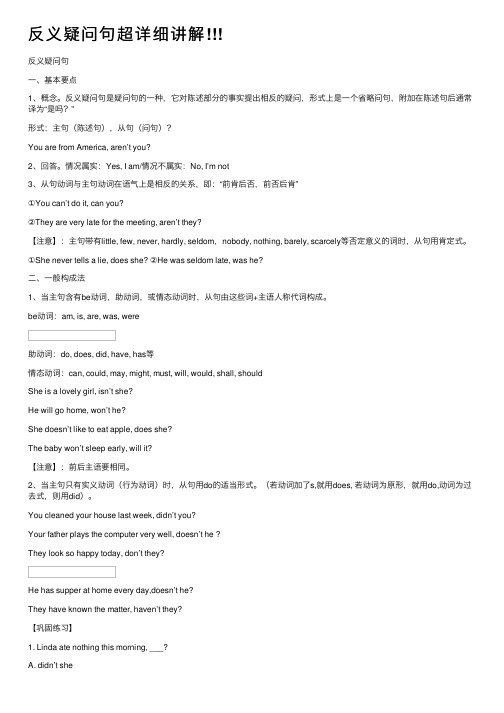
反义疑问句超详细讲解反义疑问句⼀、基本要点1、概念。
反义疑问句是疑问句的⼀种,它对陈述部分的事实提出相反的疑问,形式上是⼀个省略问句,附加在陈述句后通常译为“是吗?”形式:主句(陈述句),从句(问句)?You are from America, aren’t you?2、回答。
情况属实:Yes, I am/情况不属实:No, I’m not3、从句动词与主句动词在语⽓上是相反的关系,即:“前肯后否,前否后肯”①You can’t do it, can you?②They are very late for the meeting, aren’t they?【注意】:主句带有little, few, never, hardly, seldom,nobody, nothing, barely, scarcely等否定意义的词时,从句⽤肯定式。
①She never tells a lie, does she? ②He was seldom late, was he?⼆、⼀般构成法1、当主句含有be动词,助动词,或情态动词时,从句由这些词+主语⼈称代词构成。
be动词:am, is, are, was, were助动词:do, does, did, have, has等情态动词:can, could, may, might, must, will, would, shall, shouldShe is a lovely girl, isn’t she?He will go home, won’t he?She doesn’t like to eat apple, does she?The baby won’t sleep early, will it?【注意】:前后主语要相同。
2、当主句只有实义动词(⾏为动词)时,从句⽤do的适当形式。
(若动词加了s,就⽤does, 若动词为原形,就⽤do,动词为过去式,则⽤did)。
反义疑问句(最全)
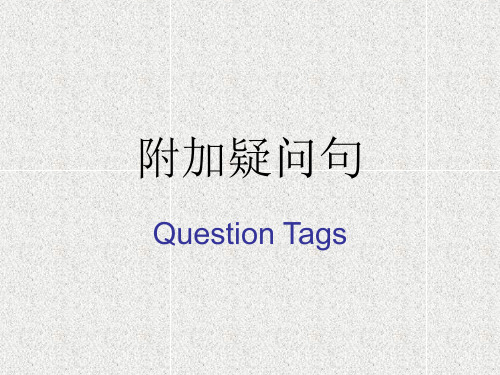
5.陈述部分有would rather +v.,疑问部分多用 wouldn’t +主语。 He would rather read it ten times than recite it, wouldn’t he? 6.陈述部分有you’d like to +v. 疑问部分用wouldn’t + 主语。 You’d like to go with me, wouldn’t you? 7.陈述部分是“there be”结构时,疑问部分用there省 略主语代词。 There is something wrong with your watch, isn't there? There will not be any trouble, will there? Note: 当为“ there used to be…”句型时,反意问句用 didn’t there。
b. 带有定语从句,宾语从句的主从复合句,疑问部分谓 语根据主句的谓语而定 He is not the man who gave us a talk, is he? He said he wanted to visit Japan, didn’t he?
c. 上述部分主句是由谓语think, believe, expect, suppose, imagine等引导的宾语从句,疑问部分与宾语 从句相对应构成bright, is he? We believe she can do it better, can't she? Note: 但此时主语必须是第一人称。如果不是,则不能否定从 句。 He thought she was wrong, didn't he? 而不能说wasn't she?
a 表示肯定推测 (一)句中陈述部分没有表示过去的时间状语,这时疑问 部分中的动词就用现在完成时。 (haven’t / hasn’t + 主语) You must have told her about it, haven’t you?
反义疑问句【详解】

• He didn’t go to the lecture yesterday, _____ did he? does she? • She doesn’t like the photo, ____ hasn’tshe? • She has gone abroad, _____ 反义疑问句的几种特殊用法: 1. 当陈述部分的主语是everybody, ever等不定代词时,反意疑问 句部分中的主语常用they。 Everyone is here, aren’t they? 2. 当陈述部分的主语是everything, anything, nothing, something等表物的不定代词时,反意疑问部分的主 语常用it。 Something is wrong with my radio, isn't it?
What a cold day, isn’t it?
10. 当陈述部分的谓语动词包括have to, had to时,反 意疑问部分通常用do的适当形式。 You had to take the early bus, didn’t you? He has to look after the child, doesn’t he? 11.当陈述部分含有情态动词must时,如果must 作 “一定;要;必须”讲,反意疑问句须用mustn't或 needn't;而当must作推测意义“一定是;必定”讲 时,反意疑问句则需根据must后的动词原形选用相 应的形式。 You must work harder and harder, mustn't you? Tom must be at home, isn't he?
3. 祈使句的反义疑问句:如果祈使句为肯定结构,则用 “won’t you?”或“will you?”。如果祈使句为否定结构, 则用“will you?”。 Look at the blackboard, will you/won’t you? Don’t talk in class, will you? 4. 以Let’s开头的祈使句,反义疑问句用“shall we?”,以 Let us开头的,用“will you?” Let’s go to the cinema, shall we? Let us read the story, will you? 5. 陈述句的谓语含有助动词(do, does, did, have, has) 时, 反义疑问句也需要使用这些词。
(完整版)反义疑问句讲解及答案

反义疑问句一.句型解释反义疑问句(The Disjunctive Question):即附加疑问句。
它表示提问人的看法,没有把握,需要对方证实。
反义疑问句由两部分组成:前一部分是一个陈述句,后一部分是一个简短的疑问句,两部分的人称时态应保持一致。
1.陈述部分肯定式+疑问部分否定式2.陈述部分否定式+疑问部分肯定式She was ill yesterday, wasn’t she?You didn’t go, did you?二.特殊的句型1.祈使句。
祈使句后一般加上will you或won't you构成反意疑问句,用will you 多表示“请求”,用won't you 多表示提醒对方注意。
例如:Let引导的祈使句有两种情况:1) Let's...,后的反意疑问句用shall we或shan't we。
例如:Let's go home, shall we/ shan't we? 回家吧,好吗?2)Let us/me...后的反意疑问句用will you或won't you。
例如:Let me have a try, will you/won't you?3)祈使句都用will you 或won’t you2.当陈述部分含I think (believe, suppose...)that... 结构时,其反意疑问句须与从句的主、谓语保持一致,注意主句的主语必须是第一人称。
例如:I don't think he will come, will he?若是非第一人称,则与主句的主语相一致He thinks that she will come, doesn’t he?反意疑问句的陈述部分为I(We) don’t think(believe, suppose, consider)+ that从句时,从句为否定意义,问句部分的动词和主语仍与that从句保持一致且用肯定式。
反义疑问句讲解

Do it yourself
200080 上海市广中路642号 中国进出口公司
Main ideas
• Joe Lampson‟s decision surprised his father(1-2) • Joe Lampson‟s program improved the trading situation in business.(3) • No investment in Lampson‟s company at first.(4) Joe Lampson was once heavily in debt.(5)
注意语调:
询问问题用升调,核对信息用降调。
二、结构:
结构一: 前肯,+ 后否
eg. She is a student, isn’t she?
结构二: 前否,+ 后肯
eg. She isn’t a student, is she?
三、反意疑问句的解答步 骤
1. 判定(判断该用肯定还是否定); 2. 找动(找句子的助动词:be用be,动词原形do, 三单does,过去did,完成have); 3. 换代(将主语换为代词主格形式);
• 疑问部分常与主句保持一致。 • He said his mother would come to see him., didn‟t he? • 但陈述部分为I think/believe/suppose/figure/imagine/feel等+宾 语从句时,疑问部分应同宾语从句保持一致 • I don‟t think he can finish his work in time, can he? 我觉得他不能及时完成工作,他能吗?
反义疑问句用法归纳详解

反义疑问句用法归纳详解反义疑问句也叫反义附加疑问句。
它表示提问人的看法,没有把握,需要对方证实。
这一部分的内容在初中英语考试中也是一个常考点,特别是考查学生对疑问句的时态和回答,跟着老师一起来看看初中英语中反意疑问句的14种特殊用法,初中生一定要知道!一、反意疑问句反意疑问句是由陈述句和附在其后的附加疑问句组成。
其中附加疑问句是对陈述句所说的事实或观点提出疑问,起证实作用,一般用于证实说话者所说的事实或观点。
(表示说话者对某事有一定看法,但又不完全确定,需要对方加以证实。
)翻译为“是吗”二、反意疑问句的回答回答时,事实是肯定的用Yes;若事实是否定的则用No。
三、反意疑问句的特殊情况1.反意疑问句中问句部分的动词与陈述部分的动词在语气上成相反的对应关系,即:肯定+否定?否定+肯定?You can’t do it, can you?你不能做它,是吗?They are very late for the meeting, aren’t they?他们开会迟到了,是吗?2.附加问句的主语应与陈述句的主语保持一致,且只能用人称代词替代。
You come from Beijing, don't you?你来自北京,是不是?3.当陈述句中含有be动词,助动词,或是情态动词时,反问句部分由这些词加上主语人称代词构成:Be动词包括:am, is, are, was, were助动词有:do, does, did, have(用在完成时), has(用在完成时)等情态动词有:can, could, may, might, must, will, would, shall, should He will go home, won’t he?他要回家了,是吗?She doesn’t like to eat popcorn, does she?她不喜欢吃爆米花,是吗?4.have的不同用法,反义疑问句用不同的动词(1)have 表“有”时,反义疑问句谓语动词用have/do都行He has a new car, doesn’t/hasn’t he?(2)have表“吃,喝,玩,度过,举办”等是,反义疑问句谓语动词用doHe has supper at home every day, doesn’t he?They had a good time in Beijing, didn’t they?(3)have to表“不得不,必须”时,反义疑问句谓语动词用doKite has to help her mother, doesn’t she?(4)had better表“最好”时,反义疑问句谓语动词用hadWe had better go to school at once, hadn't we?(5)have用在完成时中,反义疑问句谓语动词用haveThey have known the matter, haven’t they?5.(1)反意疑问句的陈述部分带有little, few, never, hardly, seldom,nobody, nothing, no one, none, neither等否定意义的词时,问句部分用肯定式。
反意疑问句讲解

反意疑问句讲解1. 前肯(定)+后否(定)一、反意疑问句中问句部分的动词在时态上应和陈述部分的时态一致。
如:1。
You can do it, can’t you? 2.They are very late for the meeting, aren’t they?3.He has supper at home every day, doesn’t he? (不能用hasn’t he?)4.They have known the matter, haven’t they?5.Th ey will go to town soon, won’t they?6.He worked very hard, did n’t he?他过去工作很努力,对吧?Yes, he did. No, he didn’t.是的,他很努力。
不,他工作不努力。
二.前否(定)+后肯(定)反意疑问句的陈述部分含有not no,nothing,no one, never, hardly, little, few,seldom等表否定的词。
变反意疑问句时要用前否(定)+后肯(定)?如:1.He isn’t playing football now, is he?2.She never tells a lie, does she?(不用doesn’t she?)3.I have few books, do I?4, He was seldom late, was he?(不用wasn’t he?)5.There is little water in the bag, is there?6.Nothing is in the room, is it? 房间里什么也没有,是吗?7,The boys and girls have never been to Chongqing, have they? 孩子们从未去过重庆,对吧?三.由un-, im-, in-, dis-, 等否定意义的前缀构成的词语时,陈述部分要视为肯定含义,问句部分用否定形式。
百度百科全面讲解——反义疑问句
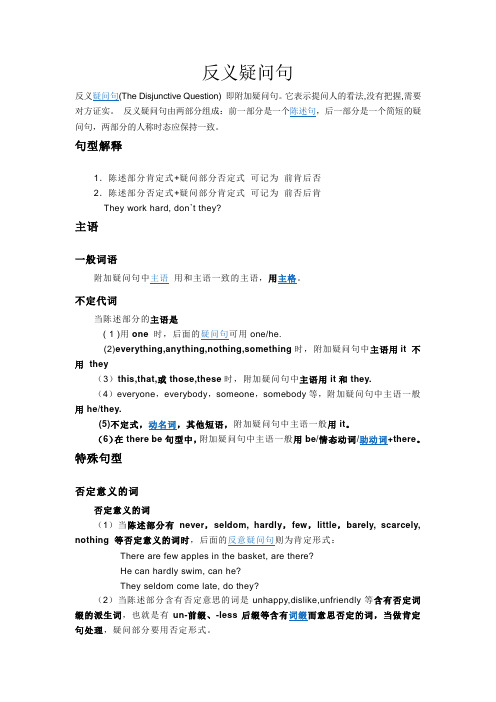
用 he/they. (5)不定式,动名词,其他短语,附加疑问句中主语一般用 it。
“It is a beautiful flower,isn't it?” “It isn't a beautiful flower,is it?”
上述两句句子的回答肯定均为“Yes,it is."否定为“No,it isn't."
由 上 述 例 子 可 知 ,反 义 疑 问 句 回 答 与 句 子 本 身 所 包 含 的 中 文 肯 定 与 否 的 含 义 并 无
She doesn't expect that we are coming so soon, does she? (3)但如 果 主 句 的时 态 是过 去时 等等 ,疑问 句 应和 主句 的人 称时态 保 持一 致 。
had better 或 have
陈述部分有 had better,或其中的 have 表示完成时态时,疑问句应用 hadn’t 等 开头:
she/he?
We suppose you have finished the project, haven't you? 值得注意的是,当这些动词后接的宾语从句的否定转移到主句时,其仍属 否定句,
故其后的简短问句应用肯定式,而;tbelieve that he can translate this book, can he?
left, is there?
must
.当陈述部分有情态动词 must,问句有4种情况: (1)mustn't 表示“禁止,不可,不必”时,附加问句通常要用 must.
英语反义疑问句最全解析

反义疑问句1)“am I”的否定形式是“aren’t I”,而不是“am not I”或“amn’t I”。
例如:I am right, aren’t I?2)everything和nothing作为陈述句的主语时是单数,因此反意疑问句中的主语要用“it”。
注意,nothing作为主语时,反意疑问句中的动词要用肯定形式。
例如:Nothing is wrong, is it?3)陈述句中的主语为everyone, everybody, anyone, nobody或no one时,反意疑问句中的主语用they。
注意,nobody和no one是否定词,因此反意疑问句应该用肯定的。
例如:Nobody knows it, do they?4)如果陈述句部分有no, never, hardly, scarcely, rarely, seldom等词,那么,陈述句本身就是否定的,所以要接一个肯定的反意疑问句。
例如:He has never been there, has he?5)如果陈述句中的动词是“wish”,那么反意疑问句中要用“may”。
例如:I wish to go there with you, may I?6)包括听话人在内时“let’s”的反意疑问句要用“shall we”。
反之,反意疑问句中要用“will you”。
例如:Let’s go, shall we?Let us go, will you?全真模拟试题1. All of the plants now farmed on a large scale were developed from plants ____ wild.A. that once growB. once they growC. they once grewD. once grew2. By the time you graduate, we ____ in Australia for one year.A. will be stayingB. will have stayedC. would have stayedD. have stayed3. He appreciated ____ the chance to deliver his thesis in the annual symposium on Comparative Literature.A. having givenB. to have been givenC. to have givenD. having been given4. The government official can hardly find sufficient grounds ____his arguments in favor of the revision of the tax law.A. on which to baseB. which to be based onC. to base on whichD. on which to be based5. Living in the desert involves a lot of problems, ____water shortage is the worst.A. not to mentionB. of whichC. let aloneD. for what6. Hydrogen is one of the most important element in the universe ____ it provides the building blocks from which the other elementsare produced.A.so thatB. but thatC. provided thatD. in that7. Just as relaxation is an important part of our lives, ____stress.A.so isB. as it isC. and so isD. the same is8. Victor took a bus and headed for home, ____ if his wife would have him back.A. not to knowB. not knownC. not knowingD. not having known9. We can make an exception ____.A. in any case of JohnB. in case of JohnC. in case of John’sD. in the case of John10. When the Cultural Revolution was launched in China, his father ______ college.A. attendedB. had been attendingC. was attendingD. has been attending11. My cat is a fussy eater, but my dog is so ____ that she’ll swallow down anything that is put in front of her.A. indiscriminateB. choosyC. indefiniteD. picky12. “This house is more ____than the federal government!” Mac complained to his parents. “You have rules for everything.”A. systematicB. democraticC. bureaucraticD. public试题答案与解析1. A)【句意】大规模种植的农作物都繁衍于野生植物。
反义疑问句讲解及答案
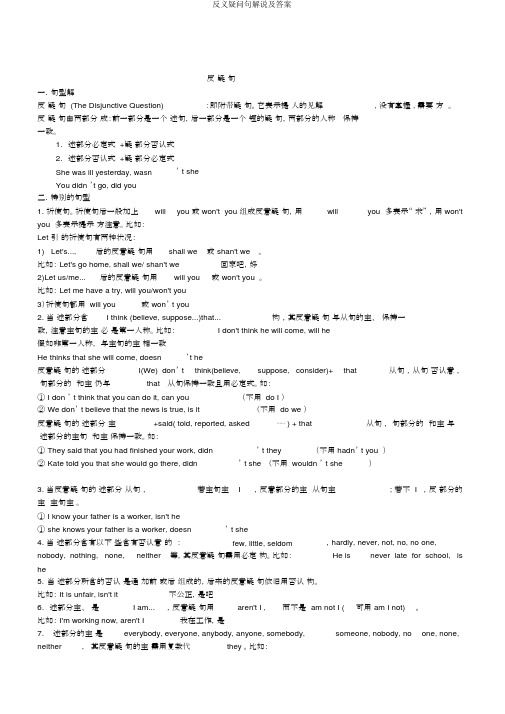
反疑句一.句型解反疑句 (The Disjunctive Question):即附带疑句。
它表示提人的见解, 没有掌握 , 需要方。
反疑句由两部分成:前一部分是一个述句,后一部分是一个短的疑句,两部分的人称保持一致。
1.述部分必定式 +疑部分否认式2.述部分否认式 +疑部分必定式She was ill yesterday, wasn’ t sheYou didn ’t go, did you二.特别的句型1. 祈使句。
祈使句后一般加上will you 或 won't you 组成反意疑句,用will you 多表示“ 求” ,用 won't you 多表示提示方注意。
比如:Let 引的祈使句有两种状况:1) Let's...,后的反意疑句用shall we或 shan't we。
比如: Let's go home, shall we/ shan't we回家吧,好2)Let us/me...后的反意疑句用will you或 won't you 。
比如: Let me have a try, will you/won't you3)祈使句都用 will you或 won’ t you2. 当述部分含I think (believe, suppose...)that...构,其反意疑句与从句的主、保持一致,注意主句的主必是第一人称。
比如:I don't think he will come, will he假如非第一人称,与主句的主相一致He thinks that she will come, doesn’t he反意疑句的述部分I(We) don’ t think(believe,suppose,consider)+that从句,从句否认意,句部分的和主仍与that从句保持一致且用必定式。
如:① I don ’ t think that you can do it, can you(不用 do I )② We don’ t believe that the news is true, is it(不用 do we )反意疑句的述部分主+said( told, reported, asked⋯⋯ ) + that从句,句部分的和主与述部分的主句和主保持一致。
反义疑问句详解

反意疑问句详解反意疑问句是由两部分组成的,前一部分是对事物的陈述(即陈述句),后一部分是简短的提问(即简短疑问句),中间用逗号隔开。
如果前一部分用肯定句,后一部分就用否定疑问句;如果前一部分用否定句,后一部分就用肯定疑问句。
两部分的人称和时态要一致。
其回答是用yes或no来表示。
但是,当陈述部分是否定形式时,回答要按事实。
如:They don’t work hard, do they? 他们不太努力工作,是吗?Yes, they do. 不,他们工作努力。
/No, they don’t. 对,他们工作不努力。
一、含be(is, are, was, were)动词的反意疑问句其句型是:句型1:主语+ be+其它,isn’t (aren’t, wasn’t, weren’t)+ 主语?句型2:主语+ be not+其它,is (are, was, were) + 主语?①You are from America, aren’t you?Yes, I am. No, I’m not.②It isn’t very cold today, is it? Yes, it is. No, it isn’t.③Tom was away yesterday, wasn’t he?Yes, he was. No, hewasn’t.④The Greens weren’t at home last night, were they?Yes, theywere. No, they weren’t.⑤Mary is reading English now, isn’t she?Yes, she is.No, she isn’t.⑥Your parents aren’t going to have a party this Sunday, arethey? Yes, they are. No, they aren’t.⑦The girls were singing when the teacher came in, weren’tthey?Yes, they were. No, they weren’t.注意:There be句型①There is an old picture on the wall, isn’t there?Yes,there is. No, there isn’t.②There aren’t any children in the room, are there?Yes,there are. No, there aren’t.③There wasn’t a telephone call for me, was there?Yes,there was. No, there wasn’t.④There were enough people to pick apples, weren’tthere? Yes, there were.No there weren’t.二、行为动词的一般现在时的反意疑问句其句型是:句型1: 主语+动词原形+其它,don’t I (you, we, they)?句型2: 主语+ don’t+动词原形+其它,do I (you, we, they)?句型3: 主语+动词第三人称单数+其它,doesn’t he (she, it)?句型4: 主语+ doesn’t+动词原形+其它,does he (she, it)?①You often watch TV in the evening, don’t you?Yes,I do. No, I don’t.②The students don’t study hard, do they?Yes, they do. No, they do n’t.③Mary studies Chinese hard, doesn’t she? Yes, she does. No, she doesn’t.④The boy doesn’t often go to school by bike, doeshe? Yes, he does. No, he doesn’t.⑤The first class begins at eight, doesn’t it?Yes, it does. No, it doesn’t.三、行为动词的一般过去时的反意疑问句其句型是:句型1: 主语+动词过去式+其它,didn’t+主语?句型2: 主语+didn’t+动词原形+其它,did +主语?①You watched TV last night, didn’t you?Yes, I did. No, I didn’t.②Jim’s parents didn’t go to Hong Kong last month, did they? Yes, they did. No, they didn’t.③The rain stopped, didn’t it?Yes, it did. No, it didn’t.④Mr. Clarke didn’t buy a car, didn’t he?Yes, he did. No, he didn’t.四、一般将来时的反意疑问句其句型是:句型1: 主语+will+动词原形+其它,won’t+主语?句型2: 主语+ won’t +动词原形+其它,will +主语?①The boys will play games, won’t they? Yes, they will. No, they won’t.②It won’t stop raining, will it?Yes, it will. No, it won’t.③Mr. Smith will visit our school next week, wo n’the? Yes, he will. No, he won’t.注意:There be句型的一般将来时①There will be a basketball match tomorrow, won’tthere? Yes, there will. No, there won’t.②There won’t be too much pollution in the future, will there? Yes, there will. No, there won’t.五、现在完成时的反意疑问句其句型是:句型1: 主语+have+动词过去分词+其它,haven’t+主语?句型2: 主语+ haven’t +动词过去分词+其它,have +主语?句型3: 主语+has+动词过去分词+其它,hasn’t+主语?句型4: 主语+ hasn’t +动词过去分词+其它,has +主语?①You have been to Shanghai before, haven’t you?Yes I have. No, I haven’t.②You haven’t been to Shanghai before, have you? Yes I have. No, I haven’t.③Jack has done his homework, hasn’t he? Yes, he has. No, he hasn’t.④Jack hasn’t done his homework, has he?Yes, he has. No, he hasn’t.六、现在完成进行时的反意疑问句其句型是:句型1: 主语+have been+动词现在分词+其它,haven’t+主语?句型2: 主语+ haven’t been +动词现在分词+其它,have +主语?句型3: 主语+has been +动词现在分词+其它,hasn’t+主语?句型4: 主语+ hasn’t been +动词现在分词+其它,has +主语?①You have been skating for five h ours, haven’tyou? Yes, I have. No, I haven’t.②You haven’t been skating for five hours, haveyou? Yes, I have. No, I haven’t.③Bob has been collecting kites since 1999, hasn’the? Yes, he has. No, he hasn’t.④Bob hasn’t been col lecting kites since 1999, hashe? Yes, he has. No, he hasn’t.七、含有情态动词的反意疑问句其句型是:句型1: 主语+情态动词+动词原形+其它,情态动词否定形式+主语?句型2: 主语+情态动词否定形式+动词原形+其它,情态动词+主语?①You can speak French, can’t you?Yes, I can. No, I can’t.②They can’t un derstand me, can they? Yes, they can. No, they can’t.③Ann could swim when she was six, couldn’t she? Yes, she could. No, she couldn’t.注意:1. 陈述句部分含有情态动词must时的具体情况⑴must表示“必须”之意,附加问句的谓语用needn’t如:They must come on time, needn’t they? Yes, they must. No, they needn’t.⑵但若表推测这层含义时,不能用must,而要根据陈述部分的不定式结构(即must之后的动词)以及含义采用相应的动词形式。
- 1、下载文档前请自行甄别文档内容的完整性,平台不提供额外的编辑、内容补充、找答案等附加服务。
- 2、"仅部分预览"的文档,不可在线预览部分如存在完整性等问题,可反馈申请退款(可完整预览的文档不适用该条件!)。
- 3、如文档侵犯您的权益,请联系客服反馈,我们会尽快为您处理(人工客服工作时间:9:00-18:30)。
优胜教育
反意疑问句专题
一、基本用法与结构
反意疑问句由“陈述句+简略疑问句”两部分组成,第一部分提出一种看法,第二部分用来质疑或表示证实。
陈述部分与疑问部分的动词时态和动词性质应保持一致,而且肯定和否定形式彼此相反,即陈述部分为肯定式时,疑问部分用否定式,陈述部分为否定式时,疑问部分用肯定式: He likes English, doesn’t he? 他喜欢英语,是吗?
He doesn’t like English, does he? 他不喜欢英语,是吗?
【注】
1. 若陈述部分含有hardly, never, few, nothing ,little,nobody,seldom 等否定词或半否定词,其疑问部分要用肯定式:
He has few friends here, has he? 他在这儿几乎没什么朋友,是吗?
She said nothing, did she? 她什么也没说,是不是?
2. 若陈述部分含有带否定前缀的词,疑问部分仍用否定式:
It is unfair, isn’t it? 这不公平,不是吗?
It is impossible, isn’t it? 那是不可能的,是吗?
3. 当陈述部分为为there be句型时,疑问部分仍用there作“主语”:
There was nothing in the room, was there? 房间里什么也没有,是吗?
4. 当陈述部分的主语是指示代词(this ,that ,these ,those)时,疑问部分用it, they等代词:
That is a new car, isn’t it? 这是一辆新汽车,是吗?
5.当陈述部分的主语是复合不定代词时,若陈述部分的主语为somebody,
someone, everyone, everybody, no one, nobody等复合不定代词,其反意疑问句的主语在正式文体中用he,在口语或非正式文体中通常用they:
Nobody was late, were they? 没有一个人迟到,是吗?
6.当陈述部分的主语是 something, anything, nothing, everything 等复合不定代词时,其反意疑问句的主语要用it:
Everything is ready, isn’t it? 一切都准备好了吗?
Nothing is important, is it? 没有什么重要的,不是吗?
二、含情态动词的反意疑问句
1. 基本原则:在通常情况下,当陈述部分含有情态动词时,疑问部分会重复前面同样的情态动词:
He can speak English, can’t he?他会说英语,是吗?
We shouldn’t go, should we? 我们不应该去,对不对?
2. 当陈述部分含有must时,要分两种情况:
①若must表示“必须”或“有必要”,疑问部分用 mustn’t 或needn’t:
You must leave at once, mustn’t [needn’t] you? 你必须(有必要)马上离开,是吗?。
